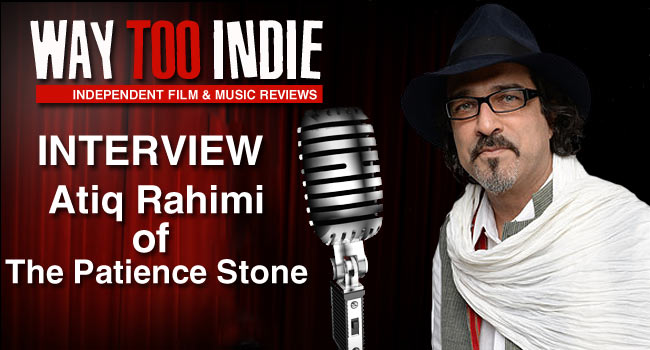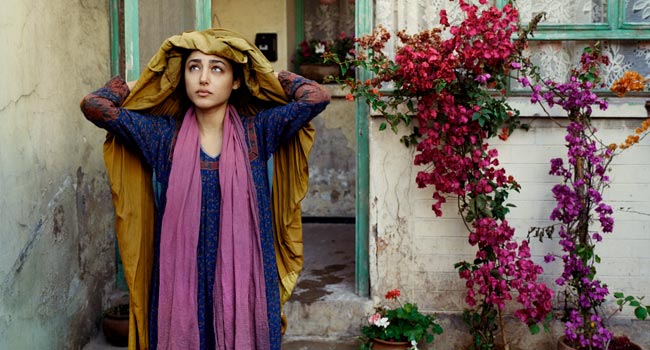Interview: Atiq Rahimi of The Patience Stone

French by way of Afghanistan filmmaker and novelist Atiq Rahimi’s new film, The Patience Stone, is an adaptation of his award-winning novel, Syngue Sabour. About a woman (Golshifteh Farahani) in Afghanistan who’s lost everything and is burdened with watching over her comatose husband, the story is framed and inspired by an old Persian folktale. Back in April during the San Francisco International Film Festival, where Rahimi screened the movie, he sat with us to discuss his filmmaking technique, why he wrote the book, storytelling in film as opposed to novels, why Farahani’s beauty is dangerous, and more.
The Patience Stone is playing in select cities now and opens in San Francisco this Friday, August 30th.
When you came up with the idea for the novel, were you thinking you wanted to tell a story of women’s liberation, then decide that Syngue Sabour would be a good way to frame it, or did you want to write a novel about the folk tale, which then evolved into a tale of liberation?
(laughs) No, no. In the beginning, I didn’t ask myself about that. This is why I wrote the book—in 2005 I was invited to a literature meeting in Afghanistan, but one week before my flight, the meeting was cancelled because a young Afghan poetess was assassinated. I asked why she was assassinated. Was it Taliban? No. She was assassinated by her husband. Two or three weeks later, I went to Afghanistan to investigate. I wanted to write about it in an article for a French magazine.
Her family didn’t want to meet me. Her husband, who was in jail, tried to commit suicide by injecting himself with gasoline. He didn’t die, but was hospitalized and in a coma. I saw him from afar in this situation, and it inspired me to write this story. If I was a woman, I’d be here, close to this man, just to tell him everything. It was just that—not about liberation, not about trying to define feminism. No. It was about my emotions, my sentiments in front of this situation, this drama.
I don’t know how I wrote the story. How, why. I don’t know. In the beginning, I wanted to be inside of the man’s head. For me, this is very important—how the man thinks when he hears anything from his wife. She talks about her sexuality, her secrets. He hears everything, but he cannot move! But, I couldn’t get into his head. This woman, she comes from inside of me. I became a woman, for three months to write this story.
So, despite the big, universal themes at work in the film, this is actually a very, very personal work to you from the perspective of both the man and the woman.
Yes, it’s personal. When you write, you have so many visions about men, women, couples, religion, politics, etc. I don’t write to show what I’m thinking, but I use my thoughts to serve the story. I don’t use the story to serve my thoughts—it’s the other way around. Of course, I have a vision of liberation, of deliverance. But, this woman allowed me to explain my vision. For me, speaking is very important. We have to be free to say anything. Deliverance starts with freedom of speech. Without this, we can never, never, never be free. I made a film about the importance of speech in this kind of country, especially for a woman.
Here, you have confessional, you have psychoanalysis, but over there, we have nothing. They impose censorship, and there’s self-censorship, too. There’s a Taliban inside of us. The blue room in the film represents the woman’s blue burka. We’re inside a woman’s head, and there is a man. She has to kill the system. She has to kill this self-censorship. In Afghanistan, there is the system, the man, the mullah, who impose this censorship, but the woman self-imposes as well.
This poetess’ husband was a very good man. He was pushed by the poetess’ mother to kill her daughter. This is a problem. It’s not like all the men are bad and all the women are victims. No. To be free and true, you have to sacrifice some things. Kill some things, some systems.
So, about Syngue Sabour. It’s a legendary stone that you put in front of you, and you talk to the stone about your secrets, your suffering, until one day the stone shatters. Then, you’re free. Deliverance. When the stone shatters, this is violence, sacrifice. In the film, the woman has to kill her husband. She has to. The story is about being freed by words.

You’ve written a book and now directed a film version of this story. What can you do with the story in cinema that you couldn’t do in the book?
The first change was the language. I wrote the book in French, but the film is in Persian. In the film, it’s more about the woman’s relationship with the young soldier. Her body becomes a subject in the film, and it’s more erotic than the book.
There’s the perspective shift, too. In the book, it’s from the husband’s point of view, and in the film, it’s hers.
Yeah, of course. In the book, the narrator is inside of the blue room. He just listens to the story of the woman. In the movie, of course, we’re with the woman. The camera follows her outside of the room, it goes out on the street. We see flashbacks. These are very special. The present becomes the past.
In film, you can also show the complexity of characters. In a book, you have to explain. Pages and pages. In movies, you can show, all in the same shot, the contradictions of the characters. The contradiction in the woman’s movement, her words. All the time she’s in contradiction with herself, until the end of the movie, where she becomes one person. It’s a very complicated personality. From the beginning to the end, you can hear a change in her voice. In the beginning, it’s nasal. In the end, her voice comes from the belly.
Let’s talk about Golshifteh. She’s on-screen for virtually the entire movie, and she carries it very well.
It was not easy to find her. In the beginning, some producer asked me to shoot this film in English with great English actors, etc. Somebody proposed to me Penelope Cruz. (laughs)
Whoa!
This was impossible for me since the language was Persian. I casted so many Afghan actresses. I met her, and in the beginning I hesitated. I couldn’t take her immediately. I wanted to get to know her, talk to her. She’s very beautiful. It’s very dangerous, you know?
Why is that dangerous?
Beauty can be very dominant. I didn’t want her beauty to dominate the film. She’s very intelligent, and she’s a great artist and actress, too. At the beginning of the film, she’s not very beautiful. She couldn’t put on makeup. Slowly, she starts putting on makeup as the film goes on.
Your camera is very still when it’s inside the room, but it behaves differently outside.
I had a very good meeting with my DP, Thierry Arbogast, one of the best in the world. He knows me and how I work. Each shot is a painting for me. I have so many references—[Andrea] Mantegna, [Georges] de La Tour, and [Francisco] Goya. Persian miniatures are also a reference. I showed him these references, and he liked them. He said, “Okay, I have the references, but what do you want me to shoot?” I said, “Shoot the words.” He said, “What does that mean?” (laughs) It means your camera has to move with the words, not with the woman. The camera moves every time, but very slowly. It moves with the words of dialogue.
So, the dialogue dictates the camera, not the actions.
Right. Not the actions. When we film outside the room, it’s the actions [dictating the camera.]
So that’s the difference.
Yeah. It was really great to work with Thierry Arbogast. Sometimes, the images are very realistic, but other times they’re [painterly.] We also worked on the costumes and decorations, the lighting. But don’t forget, there are all these colors to the décor and the costumes. They make the pictures all together. It’s not only the camera. Everything. It’s the details.
Finally, tell me about the reception to the film in Muslim countries.
I was so surprised! This film was in the Abu Dhabi Film Festival. Golshifteh Farahani won the best actress award. It won the best film award in Tajikistan. In the Instanbul Film Festival, it won the human rights award. It’s good. In Afghanistan, it of course isn’t official. Maybe the fundamentalists didn’t see my film. (laughs)
